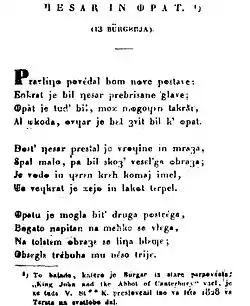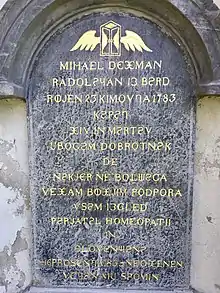Metelko alphabet
The Metelko alphabet (Slovene: metelčica) was a Slovene writing system developed by Franc Serafin Metelko. It was used by a small group of authors from 1825 to 1833 but it was never generally accepted.

| South Slavic languages and dialects |
|---|

Metelko introduced his alphabet in the book Lehrgebäude der slowenischen Sprache im Königreiche Illyrien und in den benachbarten Provinzen (Textbook of the Slovene Language of Kingdom of Illyria and Neighboring Provinces, 1825). He invented his alphabet in order to replace the formerly used Bohorič alphabet (bohoričica), which was considered problematic in certain situations. Metelko was influenced by the ideas of Jernej Kopitar, a well-known linguist who also participated in the development of the modern Serbian alphabet (created by Vuk Karadžić, following Kopitar's ideas).
Metelko's alphabet has 32 letters in following order:
A B D E ![]() F G H
F G H ![]() I Ƨ J K L
I Ƨ J K L ![]() M N
M N ![]() O
O ![]() P R S
P R S ![]()
![]() З
З ![]() T U V
T U V ![]() Ɥ
Ɥ
Special letters are explained in the following table (other letters have the same meaning as in modern Slovene):
| majuscule | minuscule | IPA | modern Slovene |
|---|---|---|---|
| ƞ | /ts/ | c | |
| Ɥ | ɥ | /tʃ/ | č |
| S | s | /s/ | s |
| /ʃ/ | š | ||
| /ʃtʃ/ | šč | ||
| /z/ | z | ||
| /ʒ/ | ž | ||
| H | h | /h/ | h |
| /x/ | h | ||
| /lj/ | lj | ||
| /nj/ | nj | ||
| E | e | /ɛ/ | e (open e; also ê) |
| /e/ | e (close e; also é) | ||
| Ƨ | ƨ | /ə/ | e (schwa; also ə) |
| O | o | /o/ | o (close o; also ó) |
| /ɔ/ | o (open o; also ô) |
Metelko wanted to solve the problem of the formerly used digraphs ZH (for /tʃ/) and SH (for /ʃ/ and /ʒ/) by replacing them with the special letters Ɥ, ![]() and
and ![]() , based on the Cyrillic letters Ч, Ш, Ж.
, based on the Cyrillic letters Ч, Ш, Ж.
Metelko also added special letters for some common clusters: ![]() ,
, ![]() and
and ![]() .
.
The difference between glottal and velar H (/h/, /x/) is in fact not relevant to Slovene phonology, and therefore the letter ![]() was omitted by some authors.
was omitted by some authors.
In the formerly used Bohorič alphabet, certain words with different pronunciation had the same spelling. Metelko wanted to solve this problem by splitting E into three and O into two variants. Metelko's letters E, ![]() and Ƨ represent the vowels /ɛ/, /e/ and /ə/, which were formerly written with E. Metelko's letters O and
and Ƨ represent the vowels /ɛ/, /e/ and /ə/, which were formerly written with E. Metelko's letters O and ![]() represent the vowels /o/ and /ɔ/, which were formerly written with O.
represent the vowels /o/ and /ɔ/, which were formerly written with O.
The main problem of Metelko's alphabet was its graphic design. Metelko's letters appeared strange to the average Slovene writer and the alphabet itself was soon nicknamed krevljica 'the twisted alphabet'. Some letters were in fact difficult to write by hand. Besides Metelko was strongly influenced by his own dialect, certain solutions were not accepted by speakers of other dialects. Soon strong opposition rose against Metelko's alphabet.
After the "Slovene alphabet war" Metelko's alphabet was forbidden in 1833. A few years later Slovenes accepted Gaj's Latin alphabet (Slovene: gajica), which is easier to write. In this alphabet variants in pronunciation are written using diacritics (é, ê, ó, ô, etc.) but only in cases when it is necessary to distinguish two words (e.g. klóp = bench; klôp = tick).
See also
Sources
- Toporišič, Jože. 1993. "Metelčica." Enciklopedija Slovenije, vol. 7, pp. 103–104. Ljubljana: Mladinska knjiga.
External links
| Wikimedia Commons has media related to Metelko alphabet. |
- Metelčica, text example
- Unicode proposal